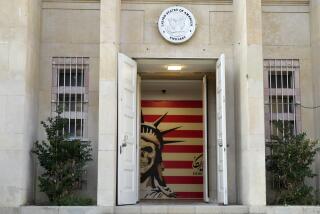Waite Denies Knowing of Arms for Iran
- Share via
LONDON — Church of England special envoy Terry Waite, flanked by three former American hostages, Monday denied any prior knowledge of U.S. arms shipments to Iran and said the controversy surrounding reports of a political deal between President Reagan and the Iranian government has seriously harmed the effort to free the remaining Americans held in Lebanon.
At a crowded news conference here, Waite denied that he was a tool of the Reagan Administration and said he has been shuttling to and from the Middle East on hostage-release missions unaware of whether U.S.-made arms were being furnished to Iran.
“The rumor and speculation of the past week have done immense harm,” Waite said, referring to Reagan’s admission that he authorized small weapons shipments to Iran and to the accompanying reports that the weapons were payment for the release of three Americans held by Lebanese extremists loyal to Iran.
The furor over Reagan’s actions, Waite said, may have meant the loss of valuable contacts inside Lebanon. “The speculation of the past week has meant that, quite understandably, many of them have now gone to ground, and they may not surface again,” he said.
Waite’s statements seemed to reflect a far more pessimistic assessment of prospects for additional releases than when he spoke to reporters two weeks ago.
At that time, he described his contacts only as “slightly nervous” and gave the impression that a return trip to Beirut and the release of additional hostages were possible.
At the news conference Monday, the three ex-hostages--the Rev. Benjamin Weir, a Presbyterian minister released in September, 1985; Father Lawrence M. Jenco, a Roman Catholic priest freed last July, and David P. Jacobsen, a onetime hospital administrator at the American University of Beirut set free earlier this month--paid tribute to Waite and prayed for the release of the remaining captives.
At one point, Jacobsen referred to Waite as a brother and “one of the greatest humanitarians who ever lived.”
It marked the first time the three ex-hostages had been together as free men.
They traveled to London with a number of American church leaders to discuss ways to free the remaining five Americans held prisoner in Lebanon.
Waite, a lay emissary of the Rev. Robert A. K. Runcie, the Archbishop of Canterbury, refused to elaborate on the London talks, which included senior members of the U.S. Episcopal, Presbyterian and Baptist churches.
“I’m keeping the contents of today’s discussions to myself,” he said.
A central purpose of Waite’s news conference appeared to be to stress his role as a mediator with no political loyalties in the Middle East.
Waite said he had become involved in efforts to free the hostages in response to the pleas of their relatives and friends and because of his belief in the ultimate value of the individual human life.
sh Hints of Use as Cover
There have been hints that Waite may have been used by Washington officials as a convenient cover to conceal the secret U.S.-Iranian arms transfers. Under repeated questioning, he denied prior knowledge of any such deal.
“I’m conscious of the fact that the minute you step into these waters, you run the risk of being used by a dozen different parties,” he said. “Everyone in a political game will use what they can to achieve their own political ends. The Iranians, the Americans, the Syrians--they all do it.
“This time last year, I found myself exposed to cross-fire whilst caught in the middle of a street battle in Beirut,” he said. “This year, one is exposed to political cross-fire.”
Waite said he will return to the Middle East as soon as there is a sign that he might make some progress, but he gave no indication of when that might be.
“My contacts in Lebanon don’t want to be associated with negotiations at that level,” he added, referring to the U.S.-Iranian contacts, some of which were conducted by former White House national security adviser Robert C. McFarlane.
U.S. officials have maintained that the arms shipments were mainly for the purpose of improving relations with Iran and not as payment for hostages.
At the news conference, former hostage Weir declared that he is opposed to any arms-for-hostages swap with Iran.
“I’d be deeply disturbed (if I found) that my release came as a result of escalating the conflict between Iran and Iraq,” he said, referring to the six-year-old Persian Gulf War.
His remarks echoed comments by Jenco, who on Sunday voiced disapproval of dealing with Iran for the hostages’ release.
sh Operating Independently
Noting that he and the three men with him were among the few Westerners who had ever met those holding the Americans, Waite rejected the contention that the terrorists are under either Syrian or Iranian control.
“I think we’re agreed and united that they (the hostage-takers) have complete control” themselves, Waite said. “We know, no matter what is said in the press, that neither Iran, Syria or other nations have direct influence on the actions of the hostage-takers.”
He also described what he called one of his more harrowing moments with the Americans’ captors--when he asked if it was money they wanted.
“I never saw them so angry,” Waite recalled. “They almost picked me up and threw me out of the room.”
In the course of the news conference, Waite also stressed his conviction that the problem of terrorism and kidnaping in the Middle East is the symptom of larger regional conflict.
“A new political will is needed to resolve this issue,” he said. “Unless we do, this problem will be repeating itself and repeating itself in an endless chain of violence.”
More to Read
Sign up for Essential California
The most important California stories and recommendations in your inbox every morning.
You may occasionally receive promotional content from the Los Angeles Times.










